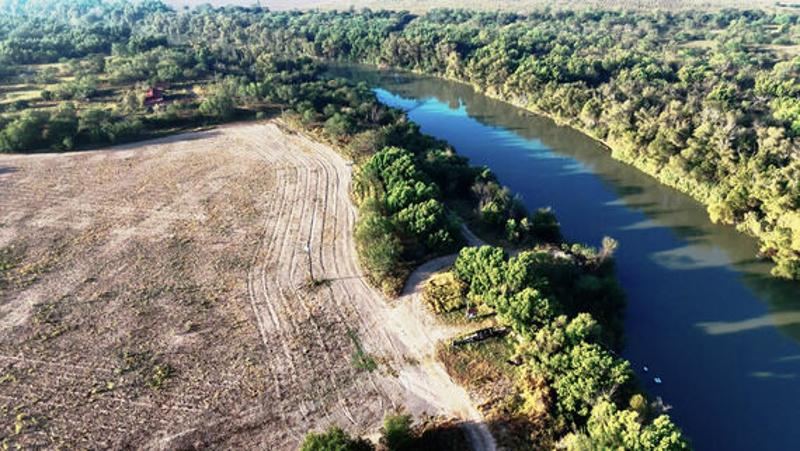President Donald Trump is taking another action against Mexico, threatening additional tariffs, withholding water shipments and considering other options as part of his demand that Mexico follow a World War II-era treaty with the U.S. to provide water to south Texas farmers.
“Mexico OWES Texas 1.3 million acre-feet of water under the 1944 Water Treaty, but Mexico is unfortunately violating their Treaty obligation. This is very unfair, and it is hurting South Texas Farmers very badly. Last year, the only Sugar Mill in Texas CLOSED, because Mexico has been stealing the water from Texas Farmers. Ted Cruz has been leading the fight to get South Texas the water it is owed, but Sleepy Joe refused to lift a finger to help the Farmers,” Trump said in a Truth Social post.
“THAT ENDS NOW,” he said, adding that he “will make sure Mexico doesn’t violate our Treaties, and doesn’t hurt our Texas Farmers. Just last month, I halted water shipments to Tijuana until Mexico complies with the 1944 Water Treaty. My Agriculture Secretary, Brooke Rollins, is standing up for Texas Farmers, and we will keep escalating consequences, including TARIFFS and, maybe even SANCTIONS, until Mexico honors the Treaty, and GIVES TEXAS THE WATER THEY ARE OWED!”
The Rio Grande Valley in Texas is among the most fertile agricultural regions in the state and country. In order to grow a wide range of crops, farmers rely on water from the Colorado and Rio Grande rivers. To manage water usage and conservation efforts, Mexico and the U.S. entered into a 1944 Treaty of Utilization of Waters.
The treaty governs water usage between the U.S. and Mexico, including from two international reservoirs, Lake Amistad and Falcon Lake in Texas along the international border. Mexico has historically released water storage from Lake Amistad to Mexican growers, not to Texas growers, and the U.S. federal government hasn’t enforced the treaty. Last year, Mexican officials killed any agreements to release water to Texans, even running ads in Mexico City to protest compliance with the treaty, according to several news reports.
For decades, the U.S. State Department hasn’t prioritized American agricultural producers in South Texas, Texas sugar growers, many in the agricultural industry and Republican and Democratic lawmakers have argued, which led to water shortages in the valley over time.
Under the Biden administration, the border crisis worsened, including the Mexican government drying out south Texas farmers, prompting multiple state and federal Democratic lawmakers in Texas to call on the Biden administration for help. They received none, The Center Square reported.
Last March, Texas’ last sugar mill announced it was shutting down as a result. South Texas growers didn’t have enough water to grow their crops, forcing more than 100 sugar growers out of business, 500 workers out of jobs and the Rio Grande Valley to lose an initial $100 million in economic losses.
The agricultural industry in the Rio Grande Valley contributes roughly $1 billion annually to the economy and provides roughly 8,400 full-time jobs, Democratic state Rep. Terry Canales said. But it’s not just the agricultural community that’s in jeopardy, he has argued. Local RGV city council members are resorting to imposing moratoriums on all new residential and commercial developments due to water shortages, he has warned.
Without water, “we are perilously close to losing a crucial economic pillar and immediate action is imperative,” he warned last year. “If we don’t start turning the ship now, the Rio Grande Valley ultimately faces the threat of the taps running dry.”
U.S. Sen. Ted Cruz and U.S. Rep. Monica De La Cruz, both Republicans from Texas, introduced several legislative measures to address the issue, including imposing sanctions on Mexico for noncompliance, which went nowhere under the Biden administration.
Last month, Cruz, De La Cruz, Rollins and others met with farmers and ranchers in the RGV to discuss solutions.
“Their situation is dire. Mexico is refusing to comply with its obligations under the 1944 Water Treaty to provide water from the Rio Grande to the US, even while we go above and beyond our own obligations to give Mexico water,” Cruz said. “The effects on Texas have been catastrophic.”
“Every option is on the table, not just withholding aid but also water we have been giving Mexico, which can be done without breaching our own obligations under the treaty,” he said.
De La Cruz expressed support for Trump imposing tariffs on Mexico for noncompliance, saying, “this is exactly the kind of leadership we need. No more free passes – it’s time countries respect their agreements or face consequences.”
Rollins said she had a productive call with the U.S. Deputy Secretary of State and her counterpart in Mexico, Secretary Julio Berdegué Sacristán, “to tackle the urgent crisis arising from Mexico’s failure to deliver water to American farmers, as obligated by treaty. American agriculture has been asking for this relief for years and didn’t get it. What’s changed now is an American President willing to do what’s necessary to make it happen.”







